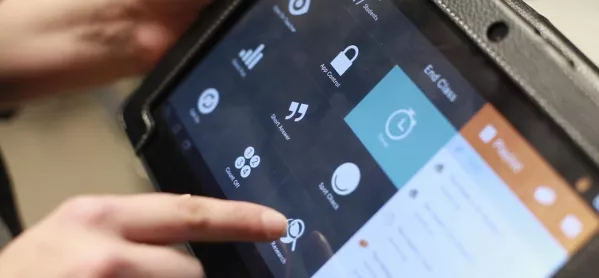
The yin and the yang of using mobile technology in the classroom

Tom Bennett, “behaviour tsar” and TES blogger, is a man who believes in hard evidence. It is little wonder, then, that he is frustrated that the recent challenges he has raised around mobile devices, classroom behaviour and learning have been subsequently (mis)interpreted as suggestions that mobile devices should be banned outright in schools, despite him stating categorically that this is not the case.
His comments come as he launches an investigation into various issues surrounding classroom behaviour - including, but not limited to, the impact of mobile devices. And although he stops shy of proposing a blanket ban, he does point out that there is little evidence beyond the anecdotal for mobile devices having a positive impact on learning, yet significant evidence that they have a negative impact on student behaviour.
But why has there been such outcry surrounding what he says? Why are some teachers (and schools) diametrically opposed to the idea of mobile devices in the classroom, while others believe that access to them is transforming their students’ learning?
As ever, it comes down to context.
Let’s start with the question of their impact on learning. The OECD report published this week on ICT use in education backs up findings from earlier attempts to aggregate the effects of educational interventions. Both John Hattie’s study of effect sizes and the work of the Education Endowment Foundation (EEF) suggest that the impact of ICT on academic achievement is limited, particularly given its significant cost; some studies even suggest this impact may be negative.
Of course, there is a question of whether academic achievement is the only thing we value in our schools. But even if we focus on this alone, there is a fundamental flaw here in treating ICT as if it is a pedagogical approach in itself. In Hattie’s work and the EEF analysis, ICT is pitched against interventions such as peer tutoring and meta-cognitive strategies, suggesting that it is actually the end goal, rather than a tool used to achieve other pedagogical aims.
It is unsurprising that simply replicating on an iPad what we once did with paper and pen has little impact on learning. However, when ICT is used purposefully to support or even transform pedagogical approaches such as collaborative working or the provision of high-quality feedback, we start to reap its rewards. The same is true of other resource-based interventions that are identified as having limited benefit in themselves - for example, the use of teaching assistants or reduction of class size. These are all means to an end, and should be treated as just part of the teacher’s toolkit.
The question of why mobile devices have a negative impact on behaviour is equally worthy of consideration. Yes, devices that provide access to games and social networks may provide distraction from the learning focus of lessons; however, today’s Candy Crush Saga, Snapchat and Facebook are really little more than a modern - albeit more compelling - replacement for classroom distractions of old: games of hangman, doodling and notes passed surreptitiously under the desk.
Neither has the solution fundamentally changed. Although our students may not always engage with the subject matter we want them to learn, nor the ways in which it is delivered, they do actually like learning; indeed, learning is at the core of most game play and social engagement. Our teachers need to provide learning experiences for students that are so engaging - whether they be based on technology, group discussion or old-fashioned “chalk-and-talk” - that the appeal of students’ devices is surpassed.
Of course, this is a simplistic perspective. An approach to learning that makes use of mobile technology will not be right for every school; learning, engagement and poor classroom behaviour can look very different in different environments, and the place of ICT within these needs careful consideration. Clear policies and behaviour management strategies also need to be in place, and school leaders have a responsibility to ensure that students, parents and teachers alike understand the appropriate use of mobile devices - and not just in terms of e-safety, but also in terms of benefit to learning and students’ personal and social development.
Tom Bennett is absolutely right - deployed without critical reflection and purpose, mobile devices in the classroom will have little impact on students’ achievement, while potentially creating unnecessary behaviour management challenges. However, when used in the pursuit of broader pedagogical and educational goals, there is potential for them to be used effectively to improve and even transform learning outcomes and the learning experience for our students.
Cat Scutt is head of learning technology and innovation at the Girls’ Day School Trust
Register with Tes and you can read five free articles every month, plus you'll have access to our range of award-winning newsletters.
Keep reading for just £4.90 per month
You've reached your limit of free articles this month. Subscribe for £4.90 per month for three months and get:
- Unlimited access to all Tes magazine content
- Exclusive subscriber-only stories
- Award-winning email newsletters
You've reached your limit of free articles this month. Subscribe for £4.90 per month for three months and get:
- Unlimited access to all Tes magazine content
- Exclusive subscriber-only stories
- Award-winning email newsletters



